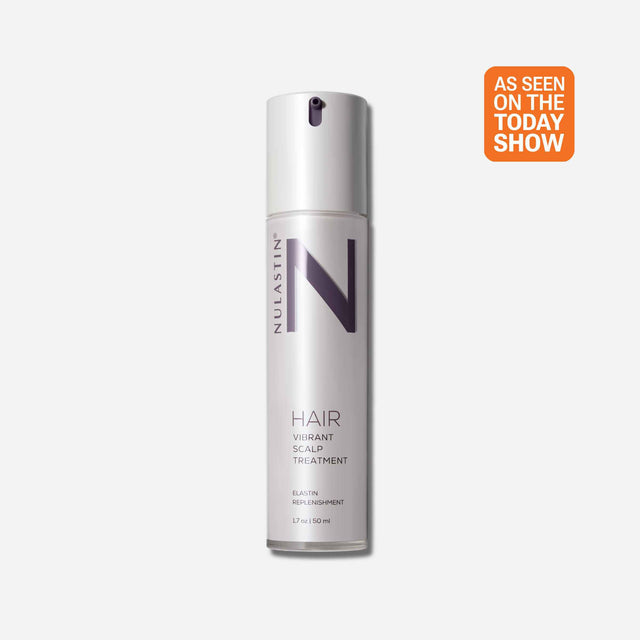If you’ve noticed your hair becoming thinner, weaker or more prone to shedding during perimenopause or menopause, you’re not alone. Many women experience menopausal hair loss due to hormonal fluctuations that impact the hair growth cycle and scalp health. But what exactly is happening—and more importantly, what can you do about it?
To help break it down, we turned to Dr. Dendy Engelman, a New York City based, board certified cosmetic dermatologist and Mohs surgeon, for expert insight on why menopause affects hair and how to combat thinning strands.
How Menopause Affects Hair Growth
Menopause and hair changes go hand-in-hand. “During perimenopause and menopause, women experience hormonal fluctuations which can alter the hair growth cycle, thereby resulting in hair thinning and loss,” explains Dr. Engelman.
A major factor? Declining estrogen levels. As estrogen drops, the body produces less sebum, leading to a dry, flaky and sensitive scalp. This not only makes hair prone to breakage and thinning, but also impacts its ability to grow at a healthy rate.
And it’s not just hair thinning—you may also notice changes in texture and shine. With reduced elasticity, your hair can start to feel dry, brittle and more fragile. The bounce and luster you once had may fade, making it harder to maintain healthy looking hair.
Signs of Menopausal Hair Thinning
One of the most common signs of menopausal hair thinning is overall thinning, where hair starts to feel finer and lacks volume. Many women also experience excess shedding, noticing more hair in their brush, shower drain or on their pillow. As estrogen levels decline, strands become weaker and more fragile, making them prone to breakage. Reduced oil production can lead to scalp dryness and irritation, causing flaking and increased sensitivity. These changes can make hair feel less resilient, affecting both its appearance and overall health.
How to Reduce Hair Thinning During Menopause
While menopausal hair loss is common, there are ways to strengthen your strands and support renewal.
1. Use a Hair Serum
Dr. Engelman suggests using a targeted scalp treatment, like Vibrant Scalp Treatment, to support your hair and scalp health during menopause. This formula is backed by clinical studies and has been shown to deliver visible improvements in the appearance of hair within 6 to 12 weeks, with continued use leading to even better results over time. It’s designed to help replenish elastin, which anchors hair at the root. By strengthening the follicle, it helps minimize visible shedding, contributing to the look of fuller, thicker hair.
2. Hydrate for Stronger, Shinier Hair
To restore lost moisture and improve shine and elasticity, incorporating emollients and humectants into your routine is essential. Humectants, like hyaluronic acid, help attract and retain moisture, keeping hair hydrated and soft. Meanwhile, emollients like jojoba oil and argan oil work to seal in moisture, smooth the hair cuticle and protect fragile strands from dryness and breakage. Jojoba oil closely mimics natural scalp oils, providing deep nourishment, while argan oil delivers an instant shine boost and helps reinforce hair’s strength and elasticity for a healthier, more resilient look.
By supplementing moisture and nourishment, these ingredients help counteract the drying effects of menopause, leaving your hair looking sleeker, shinier and healthier despite hormonal changes.
3. Protect Hair While Sleeping
Dr. Engleman suggests sleeping on a silk or satin pillowcase to reduce friction and prevent unnecessary shedding. Unlike cotton, these fabrics minimize hair breakage and help retain natural moisture.
4. Strengthen Hair from the Inside Out
Nourish your strands with a balanced diet rich in essential hair-strengthening nutrients. Protein-rich foods such as eggs, fish, and nuts help support hair structure and growth. Staying hydrated and maintaining a healthy scalp care routine also play a key role in preventing excessive dryness and breakage.
The Bottom Line: Yes, Menopause Can Cause Thinning Hair—But You Can Take Action
Menopausal hair thinning is common but manageable with the right approach. By supporting your scalp with targeted treatments like Vibrant Scalp Treatment, hydrating your strands with nourishing ingredients, and protecting your hair from damage, you can improve hair fullness and strength.








